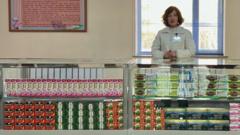The first British tourists have returned to North Korea in five years, experiencing an intricately monitored schedule as they explored Rason. Their observations included interactions with eager local guides, stark conditions in the country, and breathtaking moments that underscored the challenges faced by its people, shedding light on the nation’s complex reality.
Return to Rason: First British Tourists Explore North Korea After Five Years

Return to Rason: First British Tourists Explore North Korea After Five Years
A group of British and international tourists recently ventured into North Korea after a prolonged absence, revealing insights into the tightly controlled environment of one of the world's most secretive nations.
The local guides read a strict code of conduct before tourists cross into North Korea, a place known for its repressive atmosphere. "No insulting the leaders or the ideology. No judgments," they remind incoming visitors. Along with these regulations, they also ensure visitors understand the practicalities: absent phone signals, nonexistent internet, and no cash machines.
Rowan Beard of Young Pioneer Tours, one of two companies recently allowed to resume operations post-pandemic, shared insights into the experience. “The North Koreans are not robots. They have personal opinions and a unique sense of humor," he explained. Despite a five-year hiatus due to border closures, Beard swiftly gathered a group of travelers interested in this rare opportunity to visit.
Last Thursday, the participants drove across the Chinese border into Rason, a special zone in North Korea, for a four-night trip. This group comprised tourists from the UK, France, Germany, and Australia, including British YouTuber Mike O'Kennedy who found the sheer level of control surprising. "You can’t leave the hotel without your guides," he noted, recalling moments when restroom breaks required notification.
During their visits – pre-arranged trips to locations like a school and a newly stocked pharmacy – glimpses into authentic life and the ramifications of governance emerged. One striking moment was witnessing a group of children perform a ballet routine to animations depicting missile strikes, highlighting a surreal juxtaposition of innocence and militaristic propaganda.
Tourists were kept away from the capital, Pyongyang, and Rason was likely chosen for its controllable environment. The area functions as a semi-capitalist district where local and Chinese businesses coexist. Greg Vaczi of Koryo Tours mentioned that this environment might have contributed to more limited itineraries, with fewer opportunities to explore freely and engage with locals compared to earlier trips.
Joe Smith, an experienced traveler to North Korea, expressed the evolving nature of these visits. "Each time you get a little peek behind the curtain, which just leaves you with more questions," he observed. One notable encounter was a surprise trip to a luxury goods market – a stark contrast to the expected visitations – where foreign products and fake designer items were sold. It was a glimpse into an alternative economic reality.
Though tourism resumed, restrictions on movement were more stringent than before, often justified by COVID-19 precautions. However, guides conveyed knowledge of global events, raising questions about the authenticity of their lack of information regarding more serious international issues.
As interactions between travelers and locals occurred within tightly monitored bounds, Mike O'Kennedy noted a moment of anxiety over what he could express. In one instance, a simple message he wished to convey was deemed inappropriate by his guide.
Critics like Joanna Hosaniak from the Citizens Alliance for North Korean Human Rights question the ethics of this tourism that often enriches the regime. “Most North Koreans remain unaware of these tourists. Their funds benefit the state, ultimately reinforcing military power,” she stated.
Despite complexities, one poignant moment for Mike occurred while speaking with a young girl who expressed a dream of visiting the UK someday. "I didn't have the heart to tell her that her chances were very, very slim," he reflected, emphasizing the barriers that remain for a vast majority of North Koreans.


















